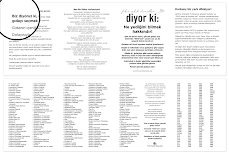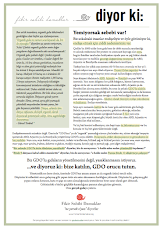Saygıdeğer Milletvekili
TBMM / Ankara
Malumaliniz olduğu üzere, komisyonlarda görüşülerek Genel Kurul sürecine gelen “Ulusal Biyogüvenlik Yasa Tasarısı” 17 Mart Çarşamba TBMM Genel Kurulu’na gelecek. Tarım Bakanı ve Tarım Bakanlığı bürokratlarının, gözünü karartarak savundukları bu tasarının yasalaşması durumunda; bu ülke yani sizin milletvekilliğini yaptığınız Türkiye, bir ömür vicdan azabından kıvranabileceğiniz tarifsiz bir akıbetle karşı karşıya kalacak.
GDO’yu yasaklıyoruz bahanesiyle çıkarılan yasa tasarısını şayet siyasi tarafgirlik ve siyasi karşıtlıktan uzak bir dikkatle okursak, hep birden “SAHİ BİR ŞEYİ YASAKLAMAK İÇİN BU KADAR KAPSAMLI ve BİR O KADAR SIĞ GEREKÇELİ BİR KANUN OLABİLİR Mİ?” demekten kendimizi alamayacağız.
TBMM’de bu ülkeyi temsil hakkını elde etmiş, her biri kıymetli Sayın Milletvekillerinin, siyasi tarafgirlik ve siyasi karşıtlıktan uzak bir şekilde bu tasarıya evet oyu vermeden, daha dikkatle okuyarak HAYIR diyeceklerini ümit etmek istiyoruz.
Bu nedenle Sağlık ve Gıda Güvenliği Hareketi olarak, özetle şunu belirterek size tarihi bir çağrıda bulunuyoruz:
Dünyanın en tartışmalı meselelerinden biri olan GDO, Türkiye’de yeterince bilinmeyen ve tartışılmamış bir meseledir.
- Tarım Bakanlığı’nın alelacele çıkardığı GDO Yönetmeliği, Danıştay Dava Daireleri Genel Kurulu’nca görüşülmeye devam edilirken,
- Anayasa Mahkemesi GDO konusunda Tarım Bakanlığı gibi düşünmediğini açıklarken,
- ABD’li GDO tohumcularının Türkiye’de GDO rüşveti dağıttığına dair Ağır Ceza Mahkemesi incelemesi devam ederken,
- Küresel güçlerle organik yahut inorganik hiçbir bağı bulunmayan sağduyulu çevreler GDO’nun meydana getireceği sorunlar konusunda açıklama üstüne açıklama yaparken, GDO’yu meşrulaştıran yeni Ulusal Biyogüüvenlik Yasa Tasarısı konusu daha çok düşünmeyi gerektirir.
GDO sorunu sadece tarımsal bir sorun değildir. Bu mesele tarım, sağlık, çevre, eğitim, ticaret gibi bakanlıklar ile Milli Güvenlik Kurulu’nun da meselesidir. Ancak mesele bu ülkede sadece tarımsal bir sorun gibi tartışılıyor.
Çünkü GDO demek;
Sayısız hastalık demek,
Kölelik demek,
İnsanlığın ortak mülkü tohumları birkaç küresel gücün insafına terk etmek demek,
Bağımsızlığından vazgeçmek demek,
Kısırlaştırılmayı kabul etmek demek,
Bitkilerin ve hayvanların bedduasını almak demek,
Dünyayı yaşanamaz bir yer haline getirmek demek,
Her mideyi misket bombası ile doldurmak demek,
Beden ve ruh sağlığından vazgeçmek demek,
İnsan ve hayvanlarda yamyamlaşma belirtileri demek,
Kötülük ve belâ demek,
Zulüm ve haksızlık demek,
Bağımlılık demek,
Dedelerimizden aldığımız emanete ihanet demek,
Ona rıza göstermek şeytana rıza göstermek demek...
Evet!
Karşı durmazsak bu belâlar gelir hepimizi bulur. Kurunun yanında yaşı da yakar.
Bu gerçeği bilerek hiçbir milletvekili bu ‘bela yasası’na izin vermeyecektir. Ama milletvekilliği, ‘bilmiyordum’ mazeretinin ileri sürülemeyeceği yüksek bir sorumluluk makamıdır.
Ezici bir çoğunlukla reddedilmesini umduğumuz tehlikeli yasa için, tüm Değerli Milletvekillerimize büyük görev düşüyor.
Bizler tıpkı sizler gibi GDO istemiyoruz. Sizinde bildiğiniz üzere Ulusal Biyogüvenlik Yasa Tasarısı, bize sol gösterip sağ vurma yasasıdır. Başbakan Yardımcısı ve Hükümet Sözcüsü Sayın Cemil Çiçek, gerçeği geçtiğimiz yıl Ulusal Biyogüvenlik Kanun Tasarısı hakkında bilgi verdiği bilgilendirme toplantısında, “Kanunun yürürlüğe girmesiyle, genetiği değiştirilmiş bitkilerin üretimine izin verilmesinin önü açılmış olacak” şeklinde ifadelendirmiştir. Bu cümleyi doğru okuma ve hatırlatmak yeterli olacaktır.
Ekte yer alan –NATURE | Vol 463 | 25 February 2010– makalesinde olduğu gibi, bu Yasa Tasarısı nedeniyle dünya bizimle “saçma bir yasa” diye alay ediyor.
Şimdi en doğru kararı verme sırası sizde.
Saygılarımızla
Sağlık ve Gıda Güvenliği Hareketi
Yönetim Kurulu ve Üyeleri
An absurd law
NATURE|Vol 463|25 February 2010
Turkey's government is about to pass legislation that could cripple the country's biological research.
When politicians respond to popular distrust of genetically modified organisms (GMOs), they sometimes fail to grasp how intricately molecular technologies infiltrate different areas of science. A case in point is now playing out in Turkey, where an attempt to regulate GMOs in agriculture has morphed into a draft law that could wipe out the country's biomedical research.
Most of Turkey's scientists learnt about the situation only a few weeks ago. Some responded immediately, organizing meetings and petitions, and lobbying parliamentarians to try to stage a last-minute reprieve. But as Nature goes to press, it seems likely that the law will be voted in by parliament this week without change. Ironically, it will go through at a time when many universities in Turkey are expanding their activities in biomedical research.
The law was first drafted after Turkey signed up to the United Nations Environmental Programme's International Cartagena Proto-col on Biosafety in 2000. This requires signatories to create legislation to regulate the international trade, handling and use of any GMO that might have adverse effects on biodiversity or human health.
Turkey was at the same time trying to align much of its legisla-tion with that of the European Union, which it aspires to join. The first draft was prepared with input from Turkey's research council, TÜBİTAK, and followed European regulations that separate deliber-ate release of GMOs into the environment — cultivation of GM crops, for example — and the contained use of GMOs for research.
Before this draft could be made law, the government changed and the mildly Islamic AK Party took office in 2002. Responsibility for the law transferred from the environment ministry to the agriculture min-istry, which did not consult with molecular biologists. Over the years, the draft law's form changed. At the same time, popular opposition to genetic engineering in general, and GM food in particular, increased.
The version now being voted on fails to distinguish between delib-erate release and contained use. It includes an outright ban on the cultivation of all GM crops, even those whose safety has been assessed and approved by expert bodies. It also bans the generation of geneti-cally manipulated animals and microorganisms.
The law does not forbid research using GMOs or products derived from genetic engineering, but it makes such research impracticable. Every individual procedure would have to be approved by an inter-ministerial committee headed by the agriculture ministry, which is allowed 90 days to consider each application with the help of experts.
The committee would be responsible for approving applications to import tonnes of GM soya beans for food — but also for every experi-ment involving even the use of a standard plasmid to transfer genes into cells. Work with universally used model organisms, from mice and zebrafish to fruitflies and bacteria, would be rendered impossible. Even if scientists could afford to wait three months for approval of the simplest experiment, the committee would be overwhelmed by the number of applications. One Turkish scientist who has examined the law estimates that his lab alone would need to submit 50 or so separate applications in a year.
It is disappointing that so important a draft law should have got so far without full consultation with all the communities affected by it. It is also disappointing that TÜBİTAK, which is close to the government but should nevertheless defend scientific interests, has so far remained silent on the issue. The Turkish Academy of Sciences is planning to prepare a position paper, but it is moving too slowly.
Turkish scientists can only hope that their individual lobbying activities will influence the vote at the last minute. Officials insist that the law will not affect research but they misunderstand. The impact will be profound. The government, which almost certainly does not wish to harm its country's fragile research base, must open its eyes to the drastic consequences of this legislation.
Mart 17, 2010
Kaydol:
Kayıt Yorumları (Atom)












1 yorum:
Would you like to understand the mechanics of the housing bubble,
which led to the huge financial crisis of 2008 ?
The director of "How to feed the world ?"
(who got 1.5 million loads on Vimeo
and was one of the Vimeo awards finalist)
tried to help !
"Bubble story" is a short movie which will help you find out, in less than 3 minutes,
how the banker's problem became YOUR problem.
http://vimeo.com/16085776
Best regards !
Denis van Waerebeke
Yorum Gönder